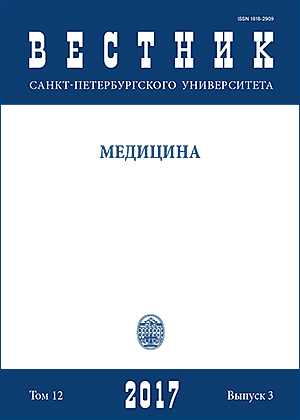COGNITIVE IMPAIRMENT DUE TO ALCOHOL ABUSE: CURRENT STATUS OF RESEARCH
DOI:
https://doi.org/10.21638/11701/spbu11.2017.306Abstract
Alcohol abuse causes significant changes in cognitive functioning. These effects are related to the fact that ethanol and acetaldehyde, its first metabolite, affect the the brain’s neurotransmitter systems. Long-term abuse may lead to the dysexecutive syndrome (DES) exhibited through emotional, behavioral and cognitive symptoms. Alcohol has a specific dose-dependent effect on memory that serves as a block of memory consolidation, i.e. transition of the short-term memories to the long-term storage.This effect displays either as reversible amnesias of events from the alcohol abuse period (blackouts), or as an irreversible fixation amnesia within Korsakoff’s syndrome. Refs 34.
Keywords:
alcohol, amnesia, blackouts, dysexecutive syndrome
Downloads
References
References
Lu R. B. Acetaldehyde involvement in positive and negative alcohol expectancies in han Chinese persons with alcoholism. Archives of general psychiatry, 2006, no. 7 (63), pp. 817–823.
cerebrospinal fluid of intoxicated humans as assayed by improved methods. Advances in experimental medicine and biology, 1980, no. 132, pp. 635–645.
brain. Alcoholism: clinical and experimental research, 1998, no. 22 (8), pp. 1623–1627.
Whitehall II Study. American journal of epidemiology, 2004, no. 3 (160), pp. 240–247.
recovery in clients with substance use disorders. Alcoholism, clinical and experimental research, 2005,no. 3 (29), pp. 367–377.
from children. British Journal of Developmental Psychology, 2003, no. 1 (21), pp. 59–80.
Frontiers in Psychiatry, 2014, no. 78 (5), pp. 1–6.
practical implications and recommendations for future studies. Alcoholism: Clinical and Experimental Research,2016, no. 40 (5), pp. 922–935.
blackouts among college students. Am. J. Drug and Alcoh. Abuse, 2004, no. 1, pp. 205–224.
hippocampal region neural activity using a microelectrode array. Alcoholism: Clinical and Experimental
Research, 2016, no. 40 (9), pp. 1857–1864.
Downloads
Published
How to Cite
Issue
Section
License
Articles of "Vestnik of Saint Petersburg University. Medicine" are open access distributed under the terms of the License Agreement with Saint Petersburg State University, which permits to the authors unrestricted distribution and self-archiving free of charge.




